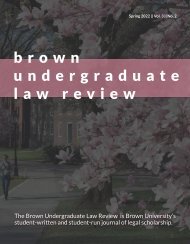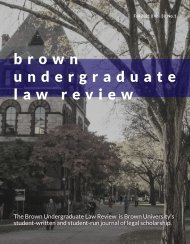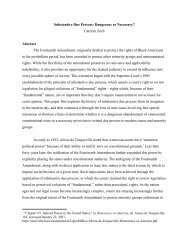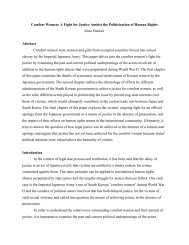Brown Undergraduate Law Review — Vol. 2 No. 2 (Spring 2021)
We are proud to present the Spring 2021 issue of the Brown Undergraduate Law Review. We hope that the works contained herein offer insight and inspiration to all who read them.
We are proud to present the Spring 2021 issue of the Brown Undergraduate Law Review. We hope that the works contained herein offer insight and inspiration to all who read them.
Create successful ePaper yourself
Turn your PDF publications into a flip-book with our unique Google optimized e-Paper software.
The Failure of the Treatment of Low-Level Offenders in the Juvenile Justice System<br />
Juvenile Justice: The Problem<br />
standing, the due process rights and equal protection<br />
statuses of these minors were never fully investigated by<br />
When Alin N. was 13 years old, the Providence School<br />
the courts.<br />
District filed a petition to truancy court to judge Alin as<br />
?wayward? and habitually truant. Alin suffers from<br />
sickle-cell anemia, a genetic disorder that causes severe<br />
pain and swelling, which often results in missed school.<br />
Because of his condition, Alin had an Individualized<br />
Education Plan, under Section 504 of the federal<br />
Rehabilitation Act, that stated he would not be punished<br />
for his absences. Despite extensive documentation, the<br />
truancy judge issued an arrest warrant for Alin and ordered<br />
his attendance at school that day and the next 30 days.<br />
Within two hours of returning to school, Alin was rushed<br />
to the hospital due to severe chest pain. It was not until<br />
months later, when a public defender presented evidence of<br />
Alin?s medical condition and Section 504 plan, that the<br />
judge dismissed Alin?s case. 1<br />
As Justice Fortas wrote in In re Gault, ?Under our<br />
Constitution, the condition of being a boy does not justify<br />
a kangaroo court.? 2 However, that is exactly what Alin<br />
experienced in the Truancy Court, a subdivision of the<br />
Rhode Island Family Court system. Alin was just one of<br />
The Bill of Rights guarantees citizens substantial<br />
protections in the context of government investigation and<br />
prosecution, including in respect to searches and arrest<br />
under the Fourth Amendment, due process, the privilege<br />
against self-incrimination and double jeopardy in the Fifth<br />
Amendment, and the right to a speedy and public trial,<br />
cross-examination, and counsel by the Sixth Amendment. 4<br />
Youth are often denied these same protections in the<br />
juvenile justice system, as illustrated by Alin?s case.<br />
Justice Fortas wrote in Gault that ?neither the Fourteenth<br />
Amendment nor the Bill of Rights is for adults alone,? but<br />
the Court has specifically endorsed in cases such as In re<br />
Gault, In re Winship, and McKeiver v Pennsylvania lower<br />
due process standards for juveniles precisely because they<br />
are children. 5<br />
Since the founding of the juvenile justice system,<br />
informality and flexibility have been endorsed in order to<br />
ensure rehabilitation instead of punishment. The right to<br />
counsel, a jury or public trial, sworn testimony, and the<br />
multiple plaintiffs in the class action lawsuit Boyer v. privilege against self-incrimination have not been<br />
Bedrosian, which detailed due process violations by<br />
Truancy Courts in Rhode Island. The complaint detailed<br />
failure to assign counsel, insufficient notice, and improper<br />
waiving of constitutional rights, rights which were<br />
extended to juvenile courts with In re Gault by the<br />
Supreme Court. Boyer v. Bedrosian was resolved by an<br />
11th-hour administrative order that rendered the class<br />
action suit moot. 3 Due to mootness, and subsequent loss of<br />
guaranteed by the juvenile justice system. The Supreme<br />
Court, recognizing the lack of procedural safeguards, ruled<br />
in 1967 with In re Gault to extend some due process<br />
protections to the juvenile court system, but denied full<br />
due process protections to juveniles that are afforded to<br />
adults in the criminal justice system. 6 The Court rests its<br />
decision on the doctrine of parens patriae, the power of<br />
the state to act for the welfare of the child. 7 However, with<br />
1. Boyer v. Bedrosian, 57 A.3d 259 (2012).<br />
2. In re Gault, 387 U.S. 1, 39 (1967), (Fortas, J., plurality opinion).<br />
3. Boyer v. Bedrosian, 57 A.3d 259, 271 - 274(2012).<br />
4. U.S. Constitution, Amend. IV, V, VI.<br />
5. In re Gault, 387 U.S. 1, 13.<br />
6. In re Winship, 397 U.S. 358, (1970).<br />
7. Irene Merker Rosenberg, ?The Rights of Delinquents in Juvenile Court: Why <strong>No</strong>t Equal Protection?? Criminal <strong>Law</strong> Bulletin 45, no. 5 (September<br />
- October 2009), 734.<br />
<strong>Brown</strong> <strong>Undergraduate</strong> <strong>Law</strong> <strong>Review</strong><br />
8










